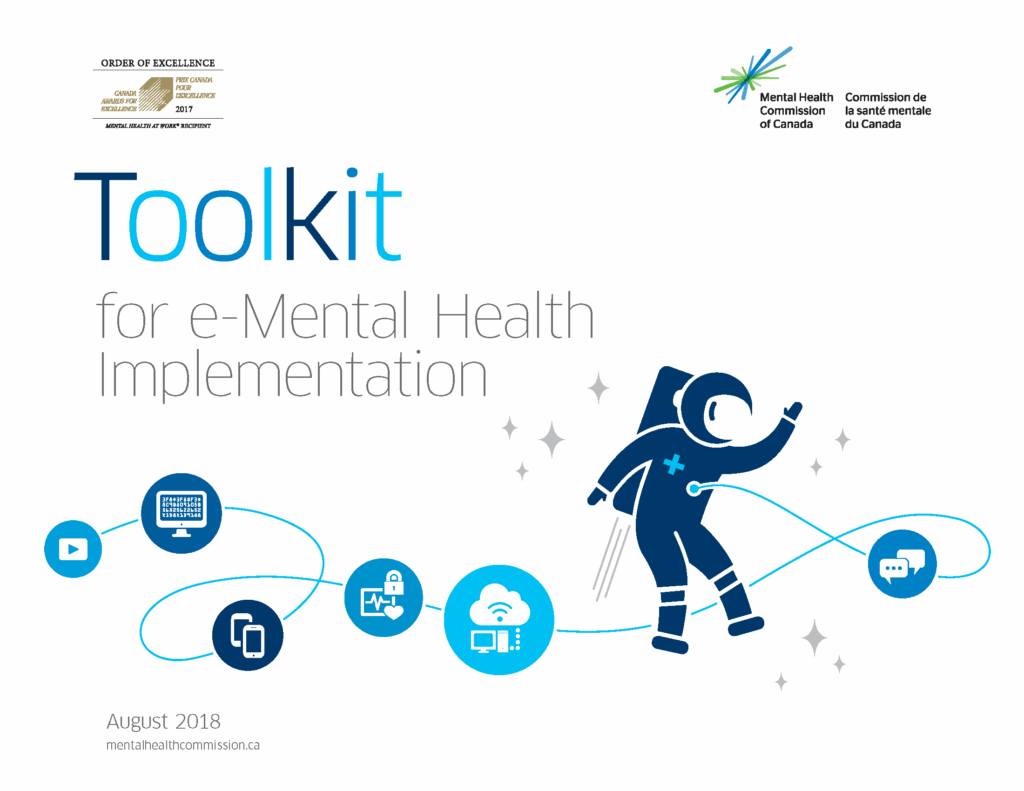Home › What We Do › e-Mental Health
Living In A Digital World
E-Mental Health
Technology can bridge the divide between need and access.
But… there’s always a but.
Technology isn’t built with a clinical or moral compass.
What is the issue?
e-Mental health delivers timely, effective mental health services by using the internet and other related technologies. Shown to be as effective as face-to-face treatment, e-mental health can provide the right care solutions when and where people need it.
e-Mental health offers:
- Rapid access and shorter wait times
- Improved accessibility in rural and remote areas and inner cities
- Availability in many languages
- Cost-effective delivery
- Services tailored to specific habits, profiles, and preferences.


What are we doing?
Our plan to advance e-mental health includes:
- Identifying and sharing best practices
- Engaging in strategic partnerships
- Advancing research
- Addressing knowledge gaps
- Investing in proven innovations.
Evidence-informed Resources
As part of our commitment to e-mental health, we offer a growing range of evidence-informed resources.

In response to the burgeoning use of e-mental health (e-MH) solutions and resources in Canada, the Mental Health Commission of Canada (MHCC) developed the first E-Mental Health Strategy for Canada, building on the MHCC’s Changing Directions, Changing Lives: The Mental Health Strategy for Canada and lessons learned from successful e-MH initiatives already established across other jurisdictions around the world.
Mental Health Research Canada (MHRC), leaders, policy makers, researchers, practitionersand people with lived and living experience, supported the MHCC in developing 6 priority areas and 12 recommendations for use in charting the future direction and development of e-MH in Canada.

As part of its commitment to advancing digital mental health care, the Mental Health Commission of Canada (MHCC) launched Canada’s first Assessment Framework for Mental Health Apps in 2023. Funded by Health Canada and in collaboration with the Organisation for the Review of Care and Health Apps (ORCHA), this national framework sets rigorous standards for safety, quality, and effectiveness in mental health apps.
Visit our Assessed Mental Health Apps page for a full list of apps that have been assessed using the framework and have received the received the MHCC badge, indicating they meet the high standards for digital mental health support.

Practical resources to help mental health providers and other people working in the field implement e-mental health innovations such as telehealth, apps, messaging services, and any internet-based technology.Watch our Toolkit for E-Mental Health Implementation webinar.Learn more from our E-Mental Health Case Scenarios and FAQ.

To help expand the use of e-mental health services, the Mental Health Commission of Canada developed four online learning modules based on our Toolkit for E-Mental Health Implementation, in collaboration with the Centre for Addiction and Mental Health (CAMH).
These interactive modules give providers, managers, and leaders knowledge, skills, and strategies to integrate e-mental health services into daily practice and support the implementation of effective, person-centred e-mental health projects.
Artificial intelligence (AI)
In medicine has been characterized as a major disruptor with the potential to change the way health care is delivered. Interest in AI in Canada began early and is continuing, with a number of advanced AI research and development labs now established.

In a first-of-its-kind initiative, national guidance for using artificial intelligence (AI) in the mental and substance use health (MHSUH) field is being developed through a partnership between the Mental Health Commission of Canada and the Canadian Centre on Substance Use and Addiction.
The new National Guidance for Artificial Intelligence Use in Mental Health and Substance Use Health Care will provide guidance, tools, and resources to help practitioners, organizations, and health leaders in efficiently evaluating and implementing AI-enabled mental health and substance use health care services and solutions.

This report is based on information from a limited literature search and targeted stakeholder consultations. Stakeholder interviews — which included individuals involved in AI and mental health via research, industry, clinical practice, and lived experience — sought to supplement information from the literature and provide perspectives for decision-makers.

A limited literature search for “artificial intelligence” and “mental health” was conducted (English documents published between January 1, 2014 and September 5, 2019). Studies that met the inclusion criteria were evaluated for strengths and limitations in their design and execution.

For mental health care, Artificial intelligence (AI) applications are being developed for the prevention, detection, diagnosis, and treatment of mental health problems or illnesses. With the high demand for mental health services in Canada, these technologies could have an important role in providing mental health care. Uncertainty remains, however, about their effectiveness and appropriate use.
To address this uncertainty and understand the current landscape of AI use for mental health, the MHCC requested a CADTH evidence review and environmental scan.
More Resources
Visual examples for people seeking care on how to use technology to access services and supports, co-created by people with lived experience of mental health problems or illnesses.
A two-pager designed to help service providers and people seeking care navigate the challenges of choosing the best apps.
Stepped Care 2.0 uses a recovery-oriented approach to provide flexible access to a range of wellness and mental health resources like e-mental health apps and online and in-person services. It’s a person-centered, evidence-informed system that structures care according to the least intensive and most effective options, giving service users the greatest likelihood of improvement. Learn more on our Stepped Care 2.0 page.
A briefing document about the opportunities and challenges of investing technology to transform the mental health care system from experts across Canada.
A literature review identifying the current knowledge gaps and opportunities revealed by the latest research.
An environmental scan of e-mental health initiatives that highlights the challenges of implementation and how to build on existing strengths.
Roundtable and conference summary reports
- Advancing Best Practices in e-Mental Health in Canada
- Addressing the Access Gap: Leveraging the Potential of e-Mental Health in Canada
- Leveraging Technology to Address Mental Health and Substance Use in Canada
- 9th Annual e-Mental Health Conference: Caring in a Digital World – Summary Report
- e-Mental Health Conference 2021 – Summary Report